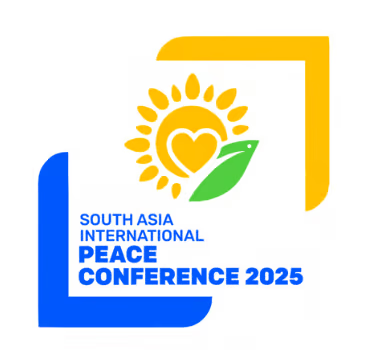

The South Asia International Peace Conference SAIPC- 2025 brings together influential leaders, policy-makers, innovators, and think tanks from across South Asia to create actionable solutions for regional challenges. With a focus on public health, environmental sustainability, and cultural integration, SAIPC 2025 embodies Rotary’s commitment to building a peaceful and prosperous future for all.
Foster sustainable solutions for environmental and economic growth in South Asia
Address critical health issues, including mental health, disease prevention, and healthcare access.
Inspire and educate young minds to become peace ambassadors and change-makers.
Embrace and showcase South Asian heritage, and culture through art, music, and traditions.

Foster sustainable solutions for environmental and economic growth in South Asia

Address critical health issues, including mental health, disease prevention, and healthcare access.

Inspire and educate young minds to become peace ambassadors and change-makers.

Embrace and showcase South Asian heritage, and culture through art, music, and traditions.
Encourage the adoption of sustainable agricultural, industrial, and consumption practices across South Asia to reduce environmental degradation and support long-term ecological balance.
Increase awareness and understanding of environmental issues among Rotary members and the broader community through workshops, seminars, and educational campaigns.
Facilitate partnerships and collaborations between Rotary clubs, governments, NGOs, and the private sector to address environmental challenges collectively and implement effective solutions.
Advocate for and support the development and implementation of renewable energy projects to reduce dependence on fossil fuels and lower carbon footprints in the region.
Promote initiatives aimed at conserving natural resources, such as water, forests, and biodiversity, to protect and sustain the environment for future generations.
Develop and implement strategies to mitigate and adapt to the impacts of climate change, focusing on vulnerable communities and ecosystems within South Asia.
Encourage the development of green infrastructure and eco-friendly urban planning to create sustainable cities and communities.
Advocate for effective waste management practices, including recycling, composting, and waste reduction initiatives, to minimize environmental pollution.
Engage and empower local communities to take an active role in environmental conservation efforts, ensuring their participation and leadership in sustainability projects.
Establish mechanisms to monitor and evaluate the impact of environmental initiatives, ensuring continuous improvement and the achievement of sustainable outcomes.
Increase access to quality healthcare services for underserved and vulnerable populations in South Asia through partnerships with local health organizations and government agencies
No, flexibConduct health education programs to raise awareness about preventive healthcare, hygiene, and nutrition among communities, thereby reducing the incidence of diseasesility is not a prerequisite for starting yoga. Yoga helps to improve flexibility over time. All levels of flexibility are welcome.
Implement initiatives focused on the prevention, early detection, and treatment of prevalent diseases such as tuberculosis, malaria, HIV/AIDS, and non-communicable diseases like diabetes and heart disease
Promote maternal and child health by supporting programs that provide prenatal and postnatal care, immunizations, and nutritional support to mothers and children
Raise awareness about mental health issues, reduce stigma, and improve access to mental health services and support systems across the region
Support the development and enhancement of healthcare infrastructure, including hospitals, clinics, and mobile health units, to ensure better service delivery in rural and urban areas
Encourage healthy lifestyles through campaigns promoting physical activity, healthy eating, and the avoidance of harmful habits such as smoking and excessive alcohol consumption.
Advocate for and implement projects that ensure access to clean water and proper sanitation facilities, reducing waterborne diseases and improving overall health outcomes
Provide training and resources to healthcare workers to enhance their skills, knowledge, and capacity to deliver high-quality care to their communities
Encourage collaboration between Rotary clubs, governments, healthcare providers, and NGOs to develop innovative solutions to health challenges and share best practices across the region
Establish mechanisms to monitor, evaluate, and report on the impact of health initiatives, ensuring continuous improvement and effectiveness in achieving health and well-being goals